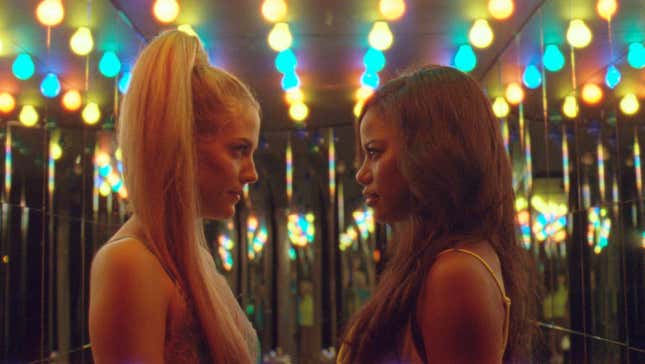

This post contains minor plot spoilers and is based on a screening of Zola at the 2020 Sundance Film Festival. A24 has not yet set a release date.
“Wanna hear a story ’bout how me and this bitch fell out?”
The opening salvo of Janicza Bravo’s newest feature film Zola—based on the infamous 2015 Twitter thread by Aziah “Zola” Wells—is merely the casual precursor to an incredible tale. What follows is a stylized romp through the seedy underbelly of Miami’s nightlife and a cautionary tale about how easily women can be made vulnerable.
The film stars Taylor Paige as Zola and Riley Keough as Stefani, the wayward dancer whose intentional ommissions gets them both into trouble on a weekend trip to dance at a Miami strip club. The pair have magnetic chemistry onscreen, and their exaggerated friendship is the alchemy that makes the film work. Paige telegraphs Zola’s growing disdain for Stefani with a series of increasingly unsubtle facial expressions, and Keough pitches her caricature of a “white girl trying to be down” to the exact right frequency—she’s ridiculous enough to deserve the audience’s ire, but not so much as to be unsympathetic or unbelievable.
Colman Domingo and Nicholas Braun round out the main cast as Stefani’s advantageous pimp and hapless boyfriend respectively. Domingo’s good looks go a long way in establishing the sleazy camaraderie that later gives way to menace when his ulterior motives are revealed. And Braun’s bumbling antics will be more than familiar to fans who know him best as Succession’s Cousin Greg.
But Zola is a triumph in more ways than one. From the writing and directing to the costuming and production design, Bravo and her team transform the famed series of tweets into an of-the-moment film that captures the same frenetic energy of the story that enraptured the internet nearly five years ago. If you were lucky enough to follow the tale when it unfolded online all those years ago, you’ll find that Zola translates the fervor and excitement of that night into an enjoyable film without once sacrificing the sarcasm or wit that was so apparent even then. Wells’s original flair for storytelling shines through, shepherded by a screenplay written by Bravo and Jeremy O. Harris. Equal parts engaging, funny and terrifying, Zola is a film very much for and about the Extremely Online.
The film’s actual plot details are largely incidental (and already widely available.) But what makes Zola so special is the way it balances conflicting tones with ease. The film is genuinely hilarious, largely due to Paige’s deadpan deliveries and exquisitely specific facial expressions. For large chunks of the film, she makes it easy to forget that this is a story about young women being trafficked against their will. But the mood changes on a dime when threats appear in the form of traveling companions ulterior motives and unwanted Johns. On the surface, it’s a first-person account of a weekend that spirals out of control. But at its core, it’s a serious contemplation on power, sex work, and the exploitation of vulnerable women. Zola begins the story feeling empowered, determined to make money and fully secure in her limits. But by the end of the first night, she has been lied to, tricked and had her clearly stated personal (and professional) boundaries crossed without her knowledge or consent, forcing her into a dangerous situation she has little to no control over. It’s a testament to Bravo’s deft hand that the repeated tonal whiplash never drops you out of the film or feels forced. Instead, the story reads like an escalating series of absurdities, until suddenly, shit gets all too real.
In many ways, Zola works in tandem with last year’s Hustlers to give another perspective on the vagaries of sex work. Unlike Hustlers, there is no pretense of glamour in Zola. The women enjoy their looks and their sexuality and their skill, but the fruits of their labor go directly to men. Bravo serves up up repeated shots of Zola’s taut body, positioning the camera from below so that she is almost sitting on the viewer, her rear-end in full view. But she follows them up with equal shots of the revulsion on Zola’s face. You’re invited to look, but she’s repulsed by those who do. Where in Hustlers, the characters’ experience with opulence positions them in time, with Zola, it signals precarity. Zola never gets as far as Ramona’s indulgent furs, but the $8,000 she earns for Stefani on Backpage secures her a small commission and the grudging respect of their abusive captor.
As with all films that premiere within the bubble of film festivals, the tenor of Zola’s reception may well change once it becomes available to wider audiences. But between Bravo’s excellent stylistic choices and Paige’s star-making turn, it’s likely this film will have an extended shelf-life.